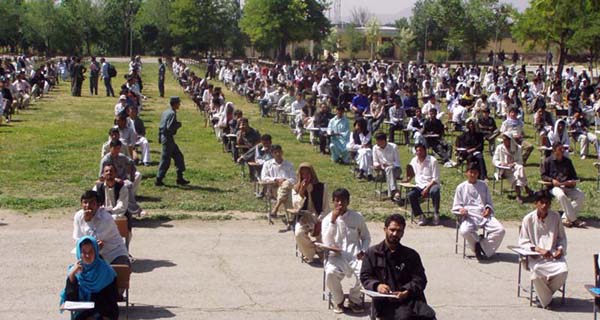Finally after months of waiting, the result of Kankor, Nationwide Entrance Exam to public universities came to an end last week. Tens of thousands of people celebrated their success and tens of thousands other shed tears for remaining behind the doors.
Since 2001, the number of students annually graduating from high school has grown up tremendously. And, hence, the number of students who take part in Kankor have also spiraled. Based on information of credible sources, around 11 million students are at school while the number of students who graduate has remained below 300 thousand. So, if the situation continue uninterrupted within just few coming years, the number of school graduates will hit million and likewise demands for higher education will reach to staggering number considering the capacity of public universities.
In 1991, around 200 thousand students participated in Kankor exam. And from them, less than half of them were accepted in universities or institutions. In institutions, student only study for two years and receive a diploma which cannot be accepted as degree. The rest, more than one hundred thousand of them, remained out with painful sighs or far dangerous social and psychological problems.
In year 1992, based on the information of Ministry of Higher Education of Afghanistan (MOHE), 261 thousand students registered names to part in Kankor but due to unknown reason 228 thousand actually participated. From total of them 110 thousand found way to universities and institutions in almost 400 faculties. Students follow education in institutions only for two years which cannot be counted as bachelor degree. Hence, from 228 thousand who participated in Kankor, only around 25 percent of them have found position in public universities.
The failure of students to such extent, for countries like Afghanistan, is indeed horrific. It was not a big deal if the Afghan families had good economic standing. Most of these students completed schools with gruesomely economic miseries. Their families tolerate cruel poverty in order to allow their children to study, hoping that one day their children get job and solve their economic problem. Here the chances are too limited. For many, the first try is the first and last one--succeed or live forever with nostalgia of getting higher education.
Though private higher education institution have developed well during past ten years, some of which surpassed even the Kabul Central university in several fields, and also the number their students have increased tremendously, but just put glimpse to their background, the share of poorer students can be understood.
For instance, during day, the classes of private higher educational institutions are almost empty. Majority of their students are studying in the evening shift. Why?
The answer is clear. During day, they are busy, working somewhere. Means they have job and can provide their education expenses. More than hundred thousand students who remained behind the doors of public universities may not get the chance to follow their education. Indeed, those who participate Kankor, visible part of them have no dependable source of income to go private universities. Some of them do not have the second chance to take part in kankor, and due to economic problem, just forget all about studies and join hundreds of thousands manual workers. There is no authentic report in this case, but glancing at the records of Kankor participants, fresh graduated students and those try for the second and third time, it becomes obvious that large numbers of students failed in the first round of entrance exam do not try for the second and third times, perhaps, due to economic problem and disappointments.
Other than low seats of public universities, there are several problems. Outdated system and curriculum, mismanagement, teacher-oriented establishment are the challenges that students face. After twelve years of struggle and hard-work and ultimately passing through Kankor filter, students who really want to learn something get disappointed from the very start of their first semester. Many teachers who snatched a teaching seats appear like a dictator instead of being supporter who guide students to a brighter future. At the very introduction day instead of welcome to fresh students, they talk about their years of teaching experience and power how no one can touch them. in order not be challenged by questions from the students about their old methods and outdated teaching materials, they start threatening students of exam and their exam paper, giving indirect notice that they will be revenged if avoid following them like, let’s say, herds. If anyone dare to question, the answer will come with aggressive tone in order to warn others of not doing so.
Additionally, visible number of teachers of public universities have occupied teaching seat through bribery or connection tens of years ago. The establishment is rigid that there is no seat for talented and highly qualified figures who completed their higher education in popular global universities.
Perhaps, there is enthusiasm among Afghans who followed their higher education to return and teach in Universities like Kabul University. But they have no hope that they ever get the chance. Because the establishment is in a manner that prevents new minds to despoil the old system. As a friend who completed his Master from Germany when referred to Kabul University were rejected on account that that particular faculty is looking forward for someone with Bachelor degree!
Therefore, if serious steps are not held, then even brightest students who get the chance to follow their higher education finally end to no educational achievement.

